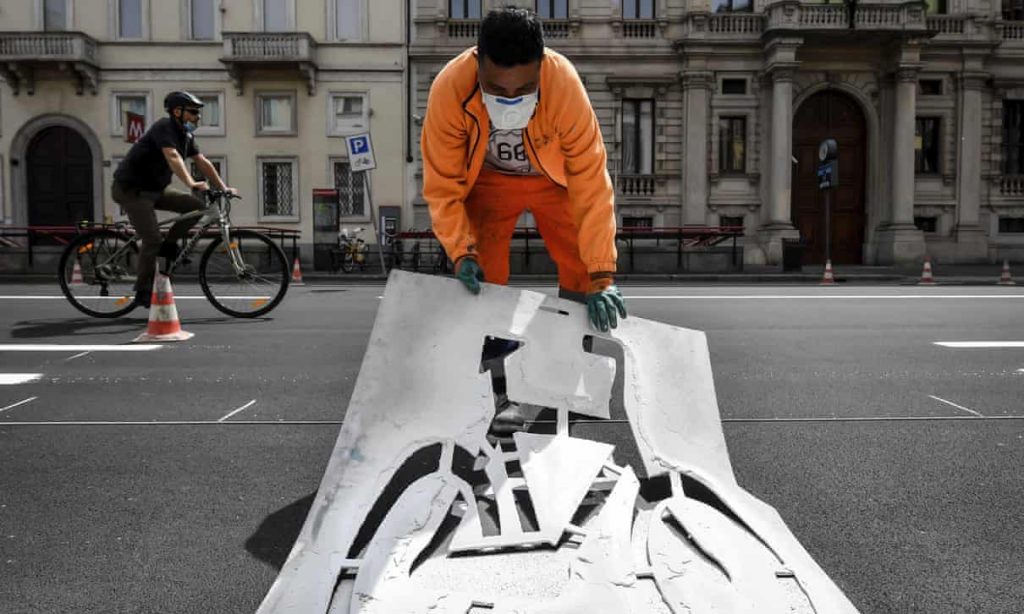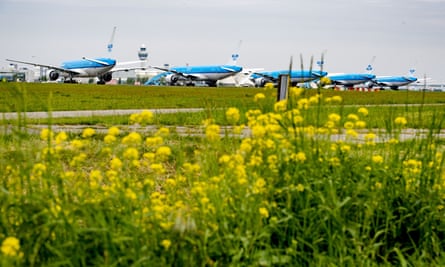After the Covid-19 crisis, will we get a greener world?

Pollution and emissions are down, but we will squander these gains if governments fail to push ahead with decisive change
The current crisis has revealed a sobering truth: the global economic shutdown, which has been achieved at a devastating social cost, has barely dented our carbon emissions. The latest analysis, by the International Renewable Energy Agency (IRENA), expects this year’s annual emissions to be down by just 6-8%. Such a small drop in emissions would have no measurable effect on the world’s carbon concentration or its warming potential. Indeed, 2020 is currently on track to be the hottest year ever recorded.
“You’d need about a 10% drop to have a noticeable effect on the rising CO2 concentrations, but even then concentrations would still be rising,” says Richard Betts, head of climate impacts at the Met Office. “The rate of rising of CO2 varies from year to year anyway, as the natural carbon sinks get stronger and weaker because of natural processes, like El Niño.” During an El Niño event, tropical forests don’t take up as much carbon, so the atmospheric CO2 rises a bit faster. And in La Niña, the opposite occurs. “That effect is probably more important than the small drop in emissions we’re seeing now.”
Considering that emissions have to fall by at least 7.6% every year to 2050 in order to keep global warming below 1.5C (above pre-industrial levels), this internationally agreed target now feels alarmingly unachievable.
“It shows that the challenge of avoiding dangerous climate change and getting to zero emissions is unbelievably hard,” says Simon Evans of climate science website Carbon Brief. “Even something which seems to be having seismic implications for the global economy, at least in the short term, like the current crisis, is something of a drop in the ocean compared to that challenge.”
And yet, the cleaner air, burgeoning urban wildlife, and our sudden, dramatic shift to a less carbon-intensive lifestyle reveal the scope of what we can achieve in just days. This is something to cling to as we navigate the twin storms of Covid-19 and climate. We know that the climate crisis will not wait for a more convenient time; we must deal with it and the pandemic crisis concurrently. It is, however, the killer disease that has provoked the strong and urgent response. Governments have been forced to step in and deal with the catastrophe in a way that is unprecedented, including supporting business and industry, and public and private infrastructure.
Individual action – driving your car less, attending a meeting via Zoom, not taking a flight – is not going to be enough
Across the world, government has never been bigger. Many experts argue that this provides us with a huge opportunity to also deal with the other crisis: to make a transformational leap towards a sustainable society that enables us to keep the world below dangerous warming. How we respond to this unique opportunity could set our climate trajectory for thousands of years to come.
These behavioral changes we’ve experienced – some of which may become ingrained permanently, meaning travel and consumption patterns become more responsible – are helpful in reducing pollution, just as hand-washing helps in the pandemic. But what the expected 8% emissions reduction figure shows us is that individual action – driving your car less, attending a meeting via Zoom rather than taking a business flight – is not going to be enough. Equally, it shows that moving to a no-growth economy is not the answer, as some have argued. Instead, systemic transformative action is required at international and state level to get the effective reductions in atmospheric carbon that will bring us to net zero.
“It means we can’t be fiddling around the edges,” says Betts. “If we are going to have a substantial impact on long-term CO2 concentrations, we need huge, lasting changes in energy systems and other things that rely on fossil fuels.”
It’s worth noting that the IRENA analysis was based on the expectation that human activity will return to some approximation of “normal” within months, so the shutdown period itself is likely to produce a far steeper drop in emissions – CO2 emissions in China fell by an estimated 25% during its February lockdown, for example. India, meanwhile, recorded its first ever annual emissions fall for the year ending March, and is expected to show a 30% drop in emissions for the month of April. “But what we’re seeing at the moment is, for the most part, very temporary,” Evans says. “When we drive again, the car still burns petrol.”

Instead, structural change could mean people swapping their combustion engines for electric vehicles. More fundamentally, Evans says, “it would involve reimagining the way our cities are built and organised, so that going without a car becomes easier, through how roads are laid out, and how provision for walking and cycling and public transport is changed.”
All of those things go far beyond the individual choices we make in our everyday lives. “Our choices are bounded by society,” Evans says, “so a shift towards a low-carbon society can’t happen via individual action alone.”Advertisement
Cities have been leading this transition with innovative buildings and infrastructure projects. Some are already banning cars and trucks as a temporary measure. Others are going further: Milan is reallocating 35km of street space to cyclists and pedestrians; Brussels is creating 40km of new cycle paths; and France is tempting cyclists out with subsidies. In the UK the government has announced a £2bn infrastructure scheme to encourage more walking and cycling and the mayor of London has unveiled measures to create car free bridges and streets. Many cities are exploring some form of a circular economy, in which waste is minimised with resources kept in use as long as possible through recycling and reuse.
The economist Kate Raworth says: “We live in a world that is complex, deeply interconnected, and human health and planetary health are woven into one. So governments need frameworks and ways of thinking that can hold that complexity – that can think about climate and health and jobs and financial stability and inequality in one space.”
For instance, quite apart from the pleasure of experiencing cleaner air, the coronavirus pandemic has revealed how deadly pollution is. One recent study found that a tiny increase in particulates was associated with a 15% increase in the Covid-19 death rate, almost certainly contributing to the terrible rates seen in cities. In Italy, the high death rates seen in the north of the country correlate with the highest levels of air pollution. Reducing air pollution would lower the general health burden and may also help prevent future pandemics from being so deadly.
“We have created a framework, which invites a place to answer: how can our cities be home to thriving people in this thriving place, while respecting the wellbeing of all people and the health of the planet?” Raworth says. She is working with the city of Amsterdam to apply her “doughnut” model of a socially and environmentally sustainable economy to the Dutch capital’s post-pandemic recovery.
The Amsterdam project, like many others, predates Covid-19. Momentum for environmental protection has been building over the past few years, and it may be that this crisis proves a tipping point in public consciousness, leading to a meaningful shift in policy. For one thing, the pandemic has shown us how valuable expertise is, and now we’re all au fait with the role of infectious disease modellers in guiding public health policy, it should help us appreciate the role climate modellers could play in guiding economic policy.

A stray cat has Taksim metro station, Istanbul, to itself. Photograph: NurPhoto/NurPhoto via Getty ImagesAdvertisement
“Just as we have seen that early action to deter the spread of the virus was far more effective than trying to contain the damage after the virus already spread, transforming our energy system now to prevent the spread of excessive heat over our planet will be far more effective than trying to adapt to the consequences of this excessive heat later,” says Ken Caldeira at the Carnegie Institution for Science, which is based in Washington DC.
Government is not there just to fix the same system, but to shape the kind of economy and society we want to live in
Mariana Mazzucato
City initiatives can only go so far. Ultimately, this is the time for governments to forge a new relationship with the private sector, to produce a sustainable economy. As industry, businesses and individuals plead for state aid, government has never been in a stronger position to push a sustainable agenda, and it’s vital this is not squandered on kneejerk bailouts. We’ve already seen the US and UK bailing out oil giants, and the UK giving supermarket giant Tesco a business rates holiday, only for it to pay a dividend to shareholders. “What the government should be doing is thinking about the interest of the public that it represents, that it was elected for, and not simply giving out money that benefits private interest,” says economist Mariana Mazzucato at University College London. “This is not about helping business make money. It’s about giving them that cashflow to survive, but also helping them transform themselves to be a more functioning part of society,” she says.
“The government will never have the negotiating hand it has now. There’s trillions being poured into the economy, given the tragedy. So, this can be used as a way to make sure that the “public private partnerships” actually become a symbiotic mutualistic partnership, not a parasitic one, as we’ve had in the health sector for a long time,” Mazzucato says.
Governments, she says, must take the long view and use stimulus packages to actively mould a cleaner economy, something that South Korea has pledged, for instance. “Government on its own cannot solve climate change, or create an equitable production system. It needs the private sector, and the private sector needs the public sector.”
Mazzucato and others argue that there’s a danger otherwise that we will repeat the mistakes that were made in the aftermath of the 2008/9 financial crisis (during which emissions also fell), by not attaching conditions to the bailouts. “Goldman Sachs was back making record profits after it was given a $10bn bailout,” she says.

Grounded planes at Schiphol airport, the Netherlands. Photograph: Robin Utrecht/Rex/ShutterstockAdvertisement
“We need to learn that government is not there just to do bailouts to fix the same system, but to really co-create – to shape the kind of economy and society we want to live in. We know that’s not a fossil fuel-driven economy; we know it’s not a financialised one; we know it’s not an unequal one. But that’s not going to happen on its own. It needs to be embedded inside the policies,” Mazzucato says. “Governments need to put strong conditions into bailout contracts, which require investment, innovation, transformation of industry, but also in society more broadly, to help us achieve these longer-term objectives.”
Ending state subsidies to fossil-fuel companies would be an easy win. The plunge in oil prices, rather than spurring a rush in fossil-fuel investment, as has happened in the past, now makes oil a volatile, uncertain commodity to invest in, especially when nations are worried about foreign dependency. The dip in oil prices may actually hasten the end of domestic extraction of all fossil fuels. So it now makes sense to shore up local renewable infrastructure, especially as costs are getting cheaper and there’s long-term certainty in the market. The scope for public sector jobs and growth in this decentralised industry could prove transformative as we stare down the tunnel of a long recession.
The IRENA believes that renewable investment could power recovery with global GDP gains of almost $100 trillion (£80tn) between now and 2050. Meanwhile, the economic risks of not meeting the globally agreed greenhouse gas emissions targets could be severe, according to research published in Nature.
There is a risk, though, that while we are so preoccupied with the pandemic, the environmental movement, which made significant progress over the past year through the activities of striking schoolchildren, Extinction Rebellion and the leadership of Greta Thunberg, falls off the agenda. The much-anticipated 2020 UN climate change conference, which sets out how nations will meet the UN climate emissions targets agreed in Paris in 2015, has been postponed from November to early 2021. In the meantime, we might forget the deadly wildfires that ravaged Australia mere months ago, or the extreme weather that displaced some 7 million people last year, or the near-record Arctic melting.
Environmental campaigners are sanguine, though, preferring to wait until the world is less distracted by the pandemic. With the US presidential elections due this year, next year’s climate talks could now get the chance to benefit from an enlightened leader ready to engage with the crisis.
“As environmentalists we have a role even during the lockdown, for instance in opposing the aviation bailout,” says Alice Bell from Possible, an organisation campaigning for a zero-carbon society. “For now, we’ve shifted to community action, people have made new relationships within their communities, and we’ve been looking at, say, the debate around park closures. This pandemic is going to profoundly change the way we live and how we work.”

Goats roam the streets of Llandudno. Photograph: Christopher Furlong/Getty ImagesAdvertisement
Global problems require global collaboration, and despite the nationalistic responses of some states, the pandemic has revealed that its solutions are international: scientists and medics have been sharing data, resources and equipment, and have been advising and supporting each other as never before, united in the quest for effective treatments, tests and vaccines. This same spirit of international cooperation is essential in producing solutions for our energy and economic transitions, and the technology and pace of information sharing make it possible. Wouldn’t it be great if wealthy nations collaborated with resource-rich (poor) nations in an inclusive global economic programme? Sustainable production of crops and minerals in the global south could help fuel the rich world’s low-carbon transition. Instead of unsustainable industrial expansion, the post-pandemic economy could be steered in a way that protects people and the planet from the kind of ecological destruction that produces new diseases, and the climate disaster that threatens us all.
In the Netherlands, for instance, 170 Dutch academics have put together a radical five-point manifesto for economic change, which includes investment in critical public sector areas, clean energy, education and health, and radically scaling back the oil, gas, mining and advertising sectors; debt cancellation, especially for workers and small business owners and for countries in the global south; and redistribution, with universal basic income, reduced working hours and the recognition of care work.
Perhaps because we’ve experienced a cleaner, quieter and kinder alternative, most people don’t actually want to get back to normal (one poll found only 9% of Britons wanted to return to pre-pandemic conditions). We should perhaps recognise this as a mandate for change, and look at the alternative to normal, taking lessons from this catastrophe to create a better world from its broken parts.
• This article was amended on 18 May 2020 because an earlier version attributed the analysis to the International Energy Agency (IEA) when the International Renewable Energy Agency (IRENA) was meant.
Gaia Vince is the author of Transcendence: How Humans Evolved Through Fire, Language, Beauty and Time (Allen Lane £20)
85 days to save the Earth …
… we’re all in. Are you? On November 4, a day after the presidential election, the US will formally withdraw from the Paris agreement on constraining global heating. It’s urgent that we tell the world what this means, and the Guardian is pulling out all the stops to do so. Will you help us by supporting our journalism?
Millions are flocking to the Guardian every day. Financial support from our readers is crucial in enabling us to produce open, fearless, independent reporting that addresses the climate emergency. It helps sustain the freedom we have to present the facts comprehensively, explain the details as they unfold, and interrogate the decisions made.
The Guardian recognises the climate emergency as the defining issue of our times. That’s why we have pledged to give climate change, wildlife extinction and pollution the sustained attention and prominence they demand, as a core part of our journalism.
At this pivotal moment for our planet, our independence enables us to always inform readers about threats, consequences and solutions based on scientific fact, not political prejudice or business interests. This makes us different. And we are equally determined to practice what we preach: we have divested from the oil and gas sectors, renounced fossil fuel advertising and committed to achieving carbon neutrality by 2030.
We believe everyone deserves access to information that is fact-checked, and analysis that has authority and integrity. That’s why, unlike many others, we made a choice: to keep Guardian reporting open for all, regardless of where they live or what they can afford to pay. Our work would not be possible without our readers, who now support our work from 180 countries around the world.
